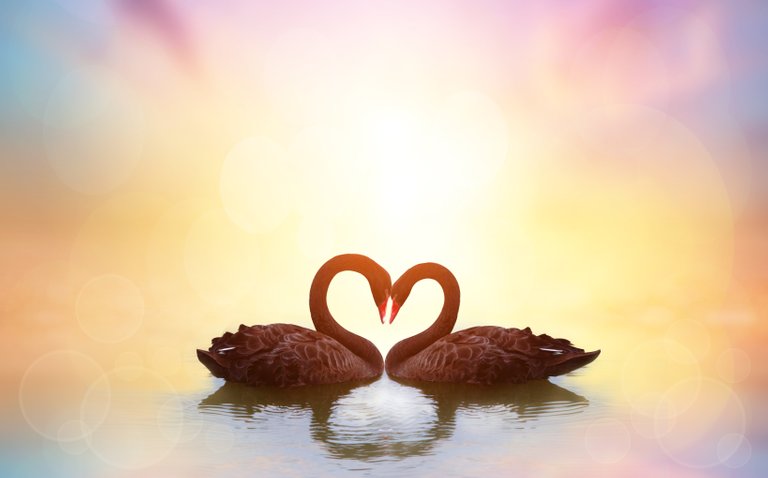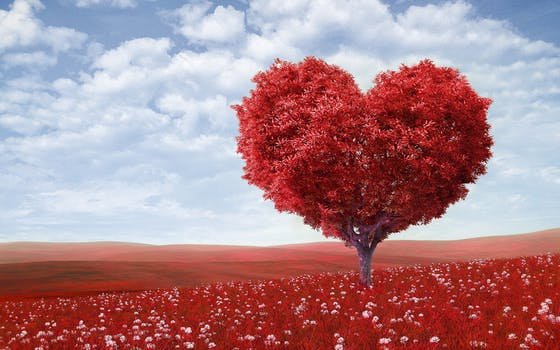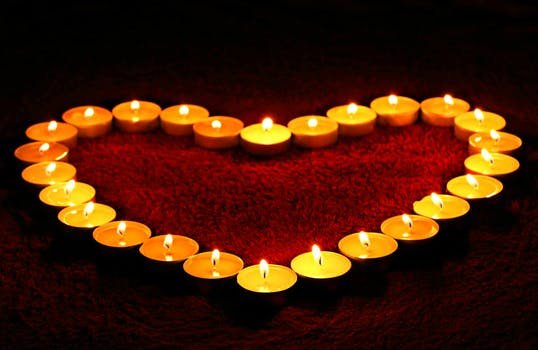
The question ‘what is love?’ has been the subject of speculation for millennia. Within the Matrix, the mainstream cultural download of unquestioned assumptions, there is plenty of confusing nonsense spoken about love. Yet it is such an important part of the human experiences. Everyone wants to love and to be loved. But what do we understand about these highly sort after experiences? If we cannot define "love" how can we know what we are looking for, and stand any chance of finding it?
After a lengthy search, the only helpful and meaningful definition of love I have found is the one offered by the brilliant thinker and writer of the last century, Ayn Rand (1905 - 1982). She suggested that "to love is to value", and that...
"Love is an involuntary response to virtue"
According to her view, we respond to the virtues we see expressed in another that are a reflection of our own deepest values. So, in essence, it is our own sense of life or our own scale of values that set the standard for who we will love. It is our own values reflected in the character of another person that elicit the emotional response that we call love.
She defined 'value' as "that which one acts to gain or keep", and virtue as the action by which one gains or keeps it". So in order to understand love we need to have a look at the concept of values and know that our own values (held consciously or unconsciously) play a crucial role.
To get a flavour of this definition and how it seems to make sense, try this little exercise. Substitute the word ‘value’ for the word ‘love’ in any sentence about someone or something that you love, such as below.
I really value my wife.
I value my car.
I value going on holidays.
I value living here.
I value this outfit.
I really value music. etc, etc.
But what does it mean to value?
Let's look a little deeper into this idea of valuing. According to Rand valuing something is recognising the positive attributes it either has or those it enables or leads to. We really value (or love) things that add a lot to our lives and the enjoyment of it. And you can say the same for the people we love. We value the positive attributes (or virtues) that they display and therefore bring to our lives. And it is because we are recognising our own deepest values (again consciously or unconsciously) that we tend to be drawn towards those who share our particular set of general values - those who see the world in the same way that we do.
We need values – our survival depends upon them
Humans cannot survive without values. Whether they are food, shelter, clothes, cars or relationships, or anything else that we need to live. We need to value things, but what is the standard of value? What do we measure the ‘value’ of things against? What is the scale of importance?
Rand suggests that life itself is the standard of value because the fundamental alternative facing any living organism is either existence or non-existence (life or death). It is our continued existence as living beings that sets the standard of what is for us and supports our life (the good), and what is against us and undermines our life (the evil). Therefore what a person perceives as for or against them, according to the sum of their premises, assumptions, beliefs etc, determines what they will love and what they will fear. From this, we can also see that evil is logically defined as 'that which is anti-life'.
Values are that which supports life, things we need for the maintenance of life and/or its enjoyment. Having a partner obviously supports our life and its enjoyment, as well as the furtherance of our genes and our ongoing investment in the future.

Loving people and loving things
We all know that we have the capacity to love people and to love things. We have the capacity to value things and to recognise the value and the virtues in people. We can love material things, events, situations or particular conditions. The scale of intensity varies from degrees of liking, through feeling affectionate towards people, to full-on romantic love of a sexual partner. With intensity depending on that which we are valuing. For example liking ice cream, being really into Reggae, and passionately loving the activity of one's true vocation expressed in work, or passionately loving our wife or husband.
It is relatively straightforward to see how we create the things that we need, but how do we create the relationships we need? Given that we cannot make anyone value us. The only thing we can do is to work on how value-able we are, and therefore how loveable we are. We can strive to be the very best version of ourselves possible. What attributes do we display that others might value? What virtues could we develop in ourselves? Everyone can build upon their value-able qualities, their virtues, and therefore the qualities that would induce people to love us as they respond to those virtues.
It is typical within the Matrix to consider love as a random favour bestowed upon us by others. We are said to be ‘lucky’ if we find true love. But is this true? It certainly renders us powerless if we believe this! On the other hand seeing love as 'the involuntary response to the virtues of another' puts us in the driver's seat and gives credence to the saying that it is less important to 'find' the right person, as to 'be' the right person. This way if we value honesty, we practice honesty and we respond to the virtue of honesty in others.
"Love, Friendship, respect, Admiration are the emotional response of one man to the virtues of another, the spiritual payment given for the personal selfish pleasure which one man derives from the virtues of another man's character. Only a brute or an altruist would claim that the appreciation of another man's virtues is an act of selflessness, that as far as one's own selfish interest and pleasure are concerned, it makes no difference whether one deals with a genius or a fool, whether one meets a hero or a thug, whether one marries an ideal woman or a slut" Ayn Rand.
This is exactly opposite to the commonly held view within the Matrix that sees love as something 'given'. Few would say that love is a self-pleasure that we take from the virtues of a partner, yet it makes far more sense if we think it through.
It is worth noting that the extent to which we hold reason as a value, and develop our own virtue of rationality we increase the likelihood of attracting a rational partner. If we remind ourselves that being rational is the essence of being sane, we can also see that raising children to be rational gives them the best chance of attracting a rational partner too, and therefore achieving a successful and happy life. The importance of being rational cannot be over stated.

Loving partners
In the pursuit of a loving partner, if we are attracted to those who share our deepest values, the best thing we can do is to be rational and pursue rational values. Consequently, we are more likely to team up with someone similarly rational. Untold misery is caused by irrationality in human behaviour - relationships in particular. There is nothing more futile than trying to make sense of irrational human behaviour or trying to change it in other people. Irrational people cannot be persuaded by reasoned argument. Walking away is the only sane choice.
Rand suggested that ‘We are beings of self-made character and self-made soul”. If we consciously build our character by being the very best version of ourselves possible, we make ourselves more loveable to others and to ourselves. If we strive to be honest, knowledgeable, productive and wise, we can give ourselves the best chance of attracting a partner. Finding the right partner is no guarantee of happiness, nor of keeping them as a partner. But we can proactively be the right partner. This all points to the idea that it all starts with the self.
Self-love as the starting point
Self-love is important because it is valuing our self and our own life. Rand said that 'the man who does not value himself cannot value anything or anyone. It, therefore, makes good sense to practice virtues so that we achieve the values we need to live and consequently have cause to value ourselves. It is easier to love ourselves when we achieve our goals, look after ourselves and do that which we know to be necessary for a successful life. It is challenging to love ourselves if we lie and cheat or sit on the sofa all day everyday eating doughnuts and pizza because we know that we are not doing what it takes to live successfully.
Self-love is really valuing the continuance of our life and it's enjoyment. It self-evidently requires focus upon the “I”, the self. It requires self-esteem which Nathaniel Branden describes as knowing that we are capable of living and therefore worthy of living. Self-love requires fulfilling one’s own needs as determined by one’s rational self-interest as the standard of need. This does not mean acting at the expense of others. It means neither sacrificing ourselves to others nor others to ourselves.
But love doesn't always make sense!
Why does love sometimes appears to not make any sense? It can appear to be totally irrational, yet the irrationality is to be found in what we choose to value and what we consider to be virtues. If our deepest values are irrational or self-defeating we cannot expect the ‘valuing’ of them to make sense. And, we cannot expect to have a successful relationship with someone else displaying a similar set of irrational values. The source of the 'non-sense' lies in the choice of values – whether held explicitly or implicitly, consciously or subconsciously. Strictly speaking loving fizzy drinks, cakes and sweets is as irrational as a woman loving a man who abuses her with violence. Both are detrimental to well being and yet loved none the less.
For example, love appears to be irrational and mysterious if we are in fact valuing the money or financial security a partner provides in disregard to the actual virtues, or lack thereof, in the character of that partner. When one person in a couple only really values the body and the sexual pleasure offered by the other over and above their rationality. It is impossible to see exactly what our partner’s value or love about us, but we can introspect honestly with ourselves and see what it is that we value in others. Rational values always stack up in a sensible hierarchy. The problem is that most often peoples values are not rational, and furthermore they are not usually even consciously considered.
Another example is choosing to focus on making ourselves into the person we think another particular person wants us to be, instead of being ourselves. This is placing a need to be accepted or loved above the virtue of being honest (not faking reality). In that situation, we would be wanting them to love a non-existent fantasy figure that is not really who we are. Irrationality always involves a departure from reality and therefore, always leads to suffering.
Do we really need love?
Almost everyone would answer 'yes' to this question. But why? Love is a wonderful emotion and we all rejoice in feeling it. This is not surprising when we see love as our appreciation of the good and the desirable and the reward for the possession of our values as embodied in our partner. Love is a response to finding the best in ourselves and in others, it is life's reward for the recognition of virtues. I see the need for love as the need for the good and the virtuous. We need material things and we need committed long-term partners. Without valuing and recognising the virtues in those we love, where would we be? So maybe love is natures reward for pursuing our highest rational values, and in recognising them in others. The greatest and fullest experience of it being romantic love enjoyed by rational men and women of self-esteem.
Within the Matrix, love is entirely a matter of the heart, with reason, logic and self-interest playing no part. But this makes no sense, and I suggest that it is 180 degrees wrong. Values cannot be discerned by the heart, only by the mind through thought. Emotions are not tools of cognition. We cannot feel our way to knowledge or values. The feeling of the love is effectively a consequence of previous thinking already done.
Many confuse loving someone with needing them. It is true that we need to find our deepest values reflected in another. But often people need someone to simply help them function or to help them cope with their existence in the world. The need to be taken care of in some way, to be supported, is not love. Yet without love as the response to virtues displayed in others or the appreciation of values possessed life is without reward, and therefore empty in some sense. There is a fine line here that points towards the absolute need for self-esteem. The man or woman with self-esteem is released from the need for support and the need to be looked after and is free to pursue the need to find their deepest values reflected in another human being.

Insights about love
If we substitute the word 'value' for 'love' and consider love to be an involuntary emotional response to the virtues displayed by another, some useful light is shed upon the many common questions around love. Such as...
Can love last forever? - Can we value someone forever? Can we forever respond to their virtues? Of course, we can, if those values or virtues remain.
Is there such a thing as ‘love at first sight’? Can we value someone upon first glance or first encounter? Why not? It remains sensible to continue to check that one's initial perception correlates with reality. Which means, am I seeing through rose tinted spectacles? It is also worth giving our values a rationality check and to distinguish between loving someone at first sight versus fancying them at first sight.
What purpose does love serve? What purpose does it serve to respond to virtues with positive emotion? What purpose is there in valuing others, valuing material things, situations or conditions? The answer is to live, thrive and prosper. If we didn’t value anything or respond to virtues we would not pursue the good, there would be no mechanism for us to pursue and appreciate the good - that which supports life.
Are there different types of love? This means, are there different types of 'valuing'? I suggest not, but there are different intensities of love/value and different things to value in different contexts. Loving a child, a new home, a lover or a bag of crisps are clearly very different things to value. The difference in the intensity with which we value things is obvious when love is considered through this definition - as well as the inappropriateness of using the word love in place of 'like' in some instances.
How can we tell if what we’re feeling is definitely love? How can I tell if I am really valuing someone? Check what your values are, check what virtues you are involuntarily responding to. What is really important? The long-term or the short-term, the flirting experience or settling down? Are you looking for a life partner of a sex buddy? What is the real value in this situation? If we are honest with ourselves we can find the answers to these questions.
How can you tell the difference between lust versus love? – ditto above.
Do you believe in love? – Do you believe in valuing people and or things? Do you believe in responding to virtue? The idea of believing in love is clearly nonsense. What people mean (even if they are unable to express it) is, do you believe in the possibility of finding a partner whom we can love and who will love us? This usually translates to 'am I loveable', which is usually a self-esteem issue, although it could arise out of being unable to find people or a partner who shares our values. It could, therefore, be disillusionment.
Definitions of Love
Rand's definition also shows how misleading or incomplete some of the popular definitions of love are...
"Love is chemistry" – responding to the virtues of another person is chemistry. There may be hormones and pheromones and all sorts of chemistry going on as we perceive and as we feel. But to say love is chemistry is misleading and meaningless.
"Love is a strong feeling of affection". This is offered by the Oxford English dictionary. It is true, but it is only a description and not a definition.
"If you love someone, you feel romantically or sexually attracted to them, and they are very important to you." This is from the Collins dictionary. Again it describes what happens when you love, but it doesn't define what it is.
"Love is self-sacrifice" – valuing or responding to virtue involves sacrificing one’s self. This just cannot be true. How can the concept of valuing another person or a thing possibly require that we give up a greater value for a lesser one – which is what sacrifice means. The idea that we need to give up our ‘self' as being the essence of love only makes sense from the altruist perspective from where it originates. Altruism is the ethics of self-sacrifice, of self-immolation, of death. It is the renunciation or giving up of values. How perfectly this suits despots, dictators and totalitarian states – in fact, all forms of control, aggression and evil. Sadly most people confuse Altruism with kindness, consideration and generosity.
"Love is the act of caring and giving to someone else…having someone’s best interest and well-being as a priority in your life." This one is out of the urban dictionary. It tells us that love is a totally selfless act. But why is it that we are so specific about who we fall in love with? It is nonsense to suggest that the attributes and qualities of one's partner are of no relevance. This completely contradicts the idea of it being self less!
"Love is commitment" translates to ‘Valuing is commitment’. Is it? If someone appeared to be of admirable character but then behaved as a scoundrel and a liar, should we continue to value them? Can you not value someone or something today without having to promise to value it (or them) always. Isn't valuing something that is done in the now? Surely if a person ceases to be virtuous it would be appropriate to cease to respond to the (now missing) virtues. Of course, rational men and women would show consistent values and in such case commitment to them would also be rational and indeed appropriate.
"Love is passionate commitment" – this translates as valuing is passionate commitment. Everyone wants to be valued passionately or intensely. To be loved mildly would not quite cut it! Passion is most often present at the beginning of a relationship. Realistically passion is akin to the new, to the novelty. Love can be calm and considered, but passion is indeed the icing on the cake. I would suggest that the degree of passion in one's love for a partner is proportional the degree of the virtues to which one is involuntarily responding as well as the freshness of the situation, or some combination of the two.
"Love is free yet it binds us" - this translates to 'Valuing is free but it binds us'. I am not sure how valuing something or responding to virtues can ever be binding. If something is binding us I would suggest that it is not love but some form of obligation. If someone loves us they may wish to possess us as their beloved, but to be bound implies coercion or lack of choice. This definition was offered by a nun (a woman religiously committed to loving God as opposed to a man).
If you want to see what nonsense people believe about love check out 36 definitions of love from the urban dictionary and compare them to the sense and meaning of Rand's definition above.

Popular catchphrases
Popular catchphrases about love do little to enhance a clear understanding of the concept...
Love is in the air - meaning, valuing is in the air. Hmm, great slogan but empty of meaning.
I need your love. In popular music culture, this simply means 'I need to have sex with you'. It can also mean that someone is insecure and has low self-esteem and therefore requires some other person to provide them with a sense of self-worth. This only muddies the waters of any understanding of the concept of love.
The power of love. Valuing can have little power beyond providing incentive or motivation. For example the incentive to assist our loved ones when they are in danger, rescuing one's beloved.
Making Love - making value. Taken literally this one is obviously nonsense. As we all know it turns love into a euphemism for sex. Sexual activity may or may not occur in a loving relationship. There is no inherent connection between the sex act and love, as the concept of rape sadly demonstrates.
Love heals - another catchphrase devoid of meaning. When concepts such as love and music are offered as a means of healing, one has to question the specific definition of the concept of 'healing'.
Love is blind - this refers to the action of loving the irrational, or of having irrational values. Rational people do not value or love the irrational. The thinking man or woman has a chance at identifying and therefore understanding their values. In the absence of thinking, we can remain blind to our values, and this is what the saying 'love is blind' really refers to. If we know what we think and we know what we feel and successfully distinguish between the two, love need not be blind.

Unconditional love
The idea of unconditional love has been touted as the highest form of love, but let's consider what this really means. To advocate unconditional love is to suggest that one should value someone or something irrespective of positive or negative qualities or attributes, irrespective of any virtues they may or may not possess. Suppose a person demonstrates no virtuous qualities at all? Suppose they are a contemptible example of humanity, a liar, a cheat or a scoundrel. Should we love them even so?
To love unconditionally would be to treat love as a first cause, a primary. If this were true, it could just be switched on and off at will. But we all know that this is not the case. We 'fall in love' in response to our special beloved, not just anyone we see walking down the street. And consider arranged marriages, how many people really want to have their partner chosen for them? How many people would be able to, or happy to, just love anyone irrespective of anything?
The concept of ‘unconditional love’ implies the giving or receiving of the unearned in spirit. To demand to be loved unconditionally means that you wish to be loved no matter what you do. This certainly suits the evil and the wicked, those who have no virtues. To love unconditionally means to love for no reason, and to divorce the concept of love from values is to render it meaningless. Must we love the cheat, the liar, the evil-doer, the parasite, the thief? I respectfully suggest not. To do so is to remove any incentive for them or anyone to aspire to virtue.
All you need is love?
What a great catchphrase it is to say 'all you need is love'! But what does it mean? Well, it implicitly suggests that we do not need anything else. I see it as a well-disguised call to inaction. But hang on, we have to create our values. Sitting about valuing without thought and subsequent action achieves nothing. This is why it is misleading at best to say “love is all you need”.
Loving is a key part of life's emotional enjoyment. It is wonderful to have a partner whose virtues one really values, just as it is to feel valued for one's own virtues. It is great to enjoy a home or possessions that we value. But if we are going to talk about a single outstanding human need, it would be more useful to say that human beings need to think and be rational. When thinking rationally becomes the widespread default activity for the human race, the Matrix as the current cultural mental construct will fade into the history books, and the golden age of peace, freedom and abundance will arrive! Bring it on.
Love and laughter
Lawful Rebel
August 2018
My humble congratulations for this extensive and deep article. Along with the beautiful pictures, it deserves a reward. I'll only add this tine piece of idea: "I think that a real lover -according to your definition of love as "value"- a real lover is the one who cares for the welfare of the other". You can tell your little girl about a special friend she has, "does he care about you? Does he mind if you are cold?...if you have a problem, does he try to help you? for if he does, perhaps he really loves her.---- Well, perhaps it's not quite so but I see it that way. But returning to your reflections, I particularly like the logical reasoning of your thought, most of which I consider true.
-- Thank you so much. I upvoted you and hope you can do the same for me.
Many thanks, nexonal. I will check out your posts.
Thanks for the post, lawfulrebel.
This bot runs through hundreds of posts per day selecting a small percentage of posts that have exceptional positivity.
Your post has been selected and upvoted because it has a high concentration of positive words that give feel-good vibes. Thank you for creating content that focuses on the bright side.
Your post has also been entered to be included in a daily roundup of positive posts.Please comment 'yes' or 'no' if you feel that my bot is correct in its judgement of this post. Your comments will be used to determine if this article belongs in the curated list. Over time, your feedback will be used to improve the judgement of this bot
Hoorah! May it be read and enjoyed by many. LR
I like the point you make regardless love as value.
It seems that most people seek certain attributes in a mate, both unconsciously and consciously, but without understanding our true selves we are only chasing surface values at best.
In regards to "self-love", I believe the best thing one can do is make yourself the best version of yourself possible.
Do this while simultaneously holding a high standard for the people you interact with, and this will filter through the "valueless" people in your life that damage you.
It certainly seems to be a continually evolving process, but what better way to pursue life than to become better and find more valueable people every day of ones life?
Excellent read! Thanks for posting,
I totally agree with the need to become the best version of ourselves. Thank you for your comments :)